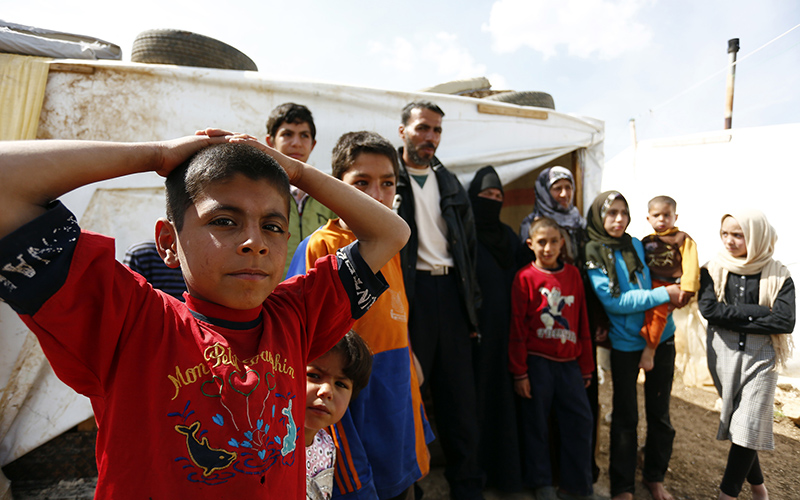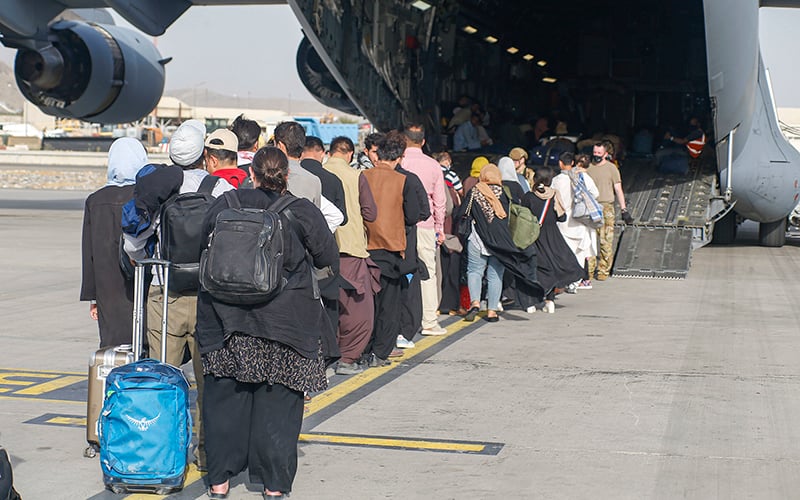
People line up to board a U.S. transport plane during the evacuation of civilians from Hamid Karzai International Airport in Kabul, Afghanistan, on Wednesday, after the Taliban’s lightning-fast takeover of the country as coalition forces withdraw. (Photo Lance Cpl. Nicholas Guevara/U.S. Marine Corps)
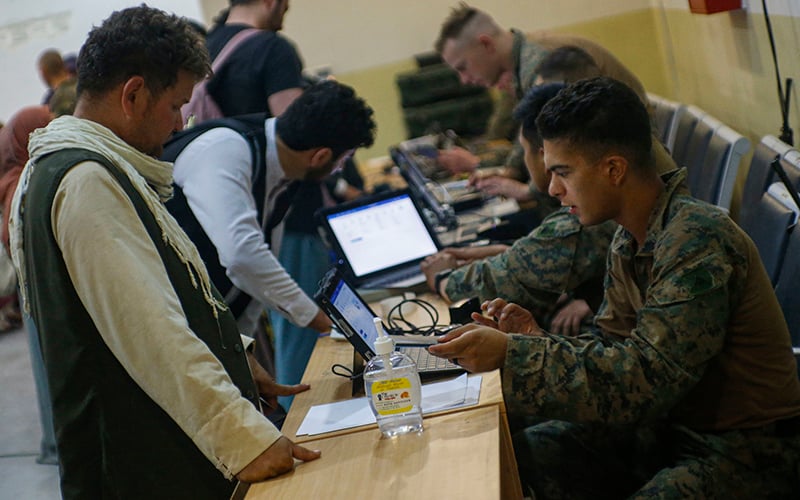
A U.S. Marine checks in evacuees Wednesday before their flight from Hamid Karzai International Airport in Kabul, Afghanistan, as U.S. and coalition forces scramble to evacuate thousands of U.S. contractors and civilians in advance of the Taliban takeover. (Photo by Lance Cpl. Nicholas Guevara/U.S. Marine Corps)
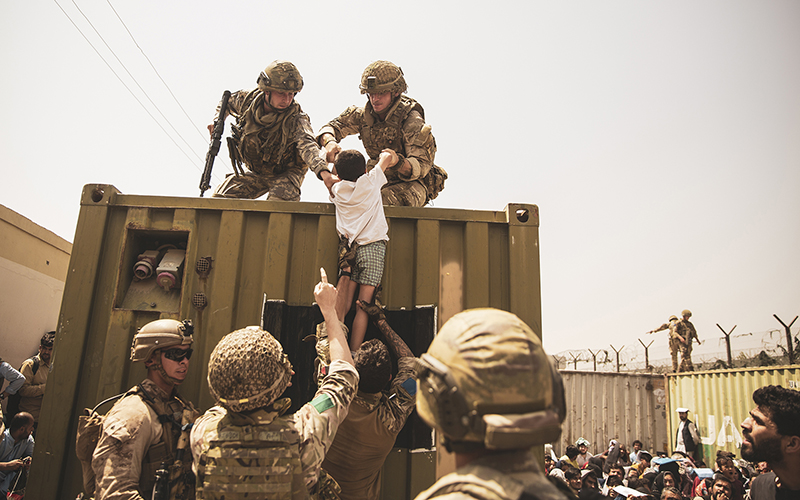
Soldiers from Turkey and the United Kingdom hoist a child to U.S. Marines during an evacuation at Hamid Karzai International Airport Friday in Kabul, Afghanistan, as U.S. and coalition forces scramble to evacuate people in the face of the Taliban retaking control of the country. (Photo by Staff Sgt. Victor Mancilla/U.S. Marine Corps)
WASHINGTON – Phoenix resident Naqibullah “Nakib” Isaczai welcomed Gov. Doug Ducey’s announcement that Arizona will accept refugees fleeing the Taliban takeover of Afghanistan – but still worries that the U.S. response will be too little, too late.
Like thousands now trying to flee, Isaczai worked as an interpreter for the U.S. Army before getting a Special Immigrant Visa to come to the U.S., a process that can take years. Years that those still in Afghanistan don’t have, he said.
“We don’t have 10 years time,” Isaczai said Friday. “We have 10 to 15 days.”
His comments came one day after Ducey and Arizona House Speaker jointly announced that the state “is working closely with federal and state officials” to offer new homes to Afghan refugees once “they have been cleared for entry into the United States for service to our military.”
There are thousands, possibly tens of thousands, of such refugees.
Julia Gelatt of the Migration Policy Institute said there was already a backlog of 18,000 Afghans seeking Special Immigrant Visas in the 15 months preceding the Taliban takeover of the country. But that does not include the applicants’ family members, a number that Gelatt said could be as high as 53,000 Afghans.
President Joe Biden on Friday vowed that the U.S. would evacuate all U.S. citizens from the country as well as “doing all we can” to evacuate Afghans who helped coalition forces and now face retribution from the Taliban.
“They were translators. They went into battle with us. They were part of the operation,” he said.
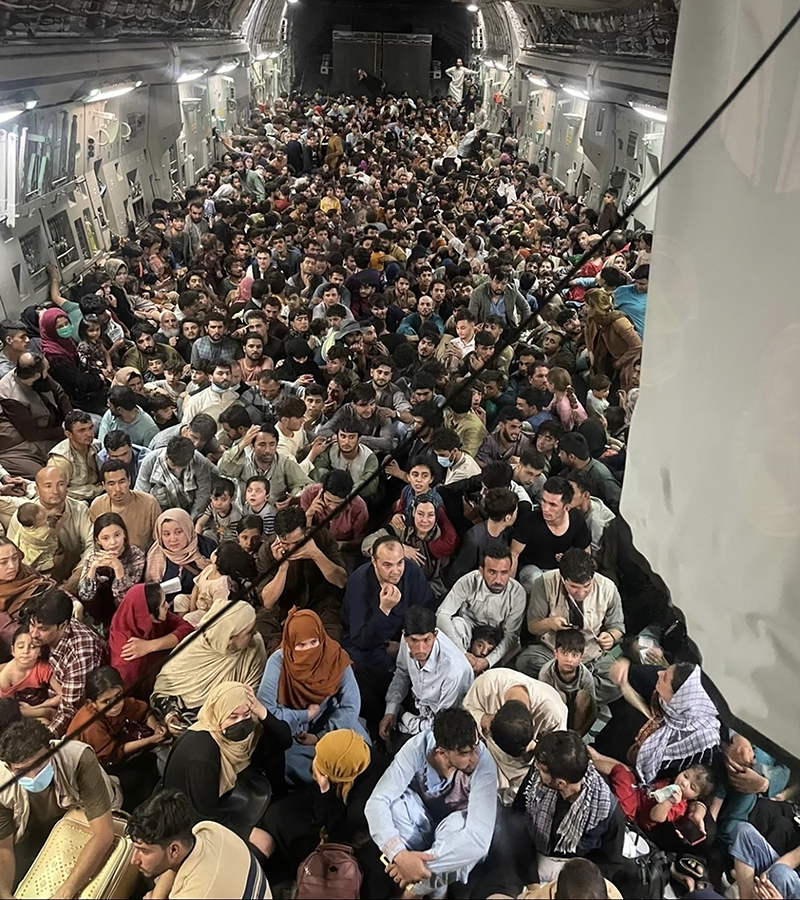
A total of 823 Afghan civilians – 640 adults with 183 children sitting in their laps – pack the hold of a U.S. Air Force C-17 Globemaster III as they flee Hamid Karzai International Airport in Kabul, Afghanistan, Sunday. The passenger count of 823 is a record for the C-17. (Photo courtesy U.S. Air Force)
Biden said the U.S. has evacuated more than 18,000 people since July, about 13,000 of whom have been in the last week, when thousands of U.S. troops went in to aid in the evacuation.
But those who worked with the U.S. government, and who qualify for an SIV, are not the only ones seeking to get out of Afghanistan – although they are likely to get to the U.S. quicker than others, non-designated refugees.
“It seems quite clear that there’s going to be a big flow of refugees out of Afghanistan,” she said. “The United States has created a special designation for Afghans who have some kind of U.S. ties, and then there are others who will qualify through the regular refugee stream.”
Since 1980, Arizona has resettled a total of 82,982 people from all countries, a number that has ranged from less than a percent just over 6% of the total who arrived in the U.S. in a given year over that time, according to data from the Arizona Department of Economic Security.
That number included 3,153 refugees from Afghanistan, according to the department’s Refugee Resettlement Program. So far in fiscal 2021, the state has received 53 Afghan refugees, down sharply from a peak of 292 in fiscal 2016.
But critics question whether all those seeking to flee Afghanistan in this current crisis should be allowed to come to the U.S. In a tweet Sunday, Rep. Paul Gosar, R-Prescott, said those the U.S. is bringing home “are not refugees” and “do not belong in our country.”
But Gelatt said that many Afghans deserve assistance, whether they are SIV recipients or not.
“They’re facing similar threats, and they’re coming from the same country, and they’re offered protection for the exact same reason, because of the threats from coming from the Taliban,” she said.
Connie Phillips, president and CEO at Lutheran Social Services of the Southwest, said what is happening in Afghanistan now “needs to be considered through a compassionate and humanitarian lens.”
She said in an emailed statement Friday that Ducey’s “symbolic gesture is a welcome one,” but that there is work ahead.
“We were expecting refugees already, and this urgency to find safety for people in crisis is sadly, not unusual,” said Phillips, adding that people “are working around the clock to process applicants as fast as possible.”
Phillips said her agency is aware of “a few individuals who are in the process of being evacuated and have expedited their assurances to come to Arizona, but do not yet have their travel schedule or arrival date.”
Isaczai, who served as a first contact between Afghans and the Army, now hopes to be a contact between Afghans and Arizona.
He initially was resettled in Los Angeles, but moved to Phoenix after a few years with the goal of climbing the corporate ladder and starting a nonprofit for homeless youth in Afghanistan.
Isaczai created the Afghan Association Arizona page on Facebook, using it to network with other Afghans in the Valley, organizing meetings at least once a month to talk about jobs and educational opportunities. Camping outings in Utah led to instructing newcomers in English, driving building better resumés.
Still, Isaczai said he and other Afghans in Arizona fear for friends and family in Taliban-occupied Afghanistan. Their connections to SIV recipients who made it out of the country put them at risk, but getting family members out of the country can take years.
As a green-card holder, Isaczai can apply for his family to come here because of his SIV status. For spouses and children under 21, that could take two to five years. For extended family. Isaczai thinks it could be as long as 10.
Isaczai worries now that American aid will not come fast enough to protect those left behind from the Taliban.
“They can find out the people, they can find out the whole data of those people that have worked with the U.S. government or U.S. Army,” Isaczai said. “That is the scariest part.”

